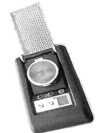Author Margaret Atwood has stirred up quite a controversy by creating a "remote booksigning device" that would allow her to "attend" booksignings without actually being there. She wrote about her invention, and the controversy, in today’s Los Angeles Times.
In an effort to simplify the most grueling part of the book-publication process
— the dreaded Author Tour — I dreamed up the concept of a remote book-signing
device. (I’ve spent far too many evenings crawling around on hotel room floors,
eating Pringles because I was too exhausted to call room service, so I needed
this!) The author would be able to relax at his or her home base and could see
and speak with a book buyer in a bookstore thousands of miles away. That much
can happen already.
But in addition, the author would be able to
actually sign — in real time, and with real ink — the book buyer’s book (or the
singer’s album, or the actor’s photograph). You would no longer have to be in
the bookstore to write "Happy Birthday, Aunt Sylvia." You would simply write on
a little pad (somewhat like the one the UPS messenger brings to your door) and
on the other end, your message and signature would be duplicated in the book.
Think of the plane trips avoided, the beer nuts left uneaten in the
hotel mini-bar, and — from the publisher’s point of view — the money saved! For
it costs a lot to whiz a bunch of disoriented and grumpy authors around the
world.
That’s exactly what she’s doing…thinking of the author or,more accurately, herself. What she’s proposing is the customer support approach towards her readers. What’s wrong with an automated menu and no live operator? What’s wrong if that live operator is someone you can barely understand in Singapore or India? It’s still customer service, right? RIGHT?
She’s forgetting the personal touch, the human interaction. The respect. It’s not just the signature that’s important to most readers, it’s the chance to meet someone who has had a dramatic and often emotional impact on their lives and imaginations. It’s a way to meet someone who has inspired and entertained you. It’s also a way for authors to see the face of the people they are writing for, the people who have supported them in their art. It’s a way to say "Thank you," for both author and reader. It’s not just a signature. And looking into a computer screen and shaking hands with a robot arm isn’t quite the same thing. What’s astonishing is that she doesn’t get that… or maybe she does.
The only difference between the author-at-a-distance and the author-in-the-flesh
would be that no author’s DNA would get onto the book, and no readers’ germs
would get onto the author.
I think this is where she betrays her real attitudes towards signings and her readers. But there’s something else I find personally offensive about her booksigning-at-a-distance machine: it’s her broad, caricatured characterization of authors as cranky assholes who think it’s a burden to meet readers.
This may come as shock to Margaret Atwood and everyone else on the planet Vulcan, but lots of authors enjoy meeting their readers, enjoy the personal contact, and derive enormous pleasure from being able to sign their books in person.
She may have unintentionally succeeded in her goal of avoiding book tours. Given her attitude towards signing and readers, who would ever want this woman to sign their books again? Who would ever want her in their store? Not me.









